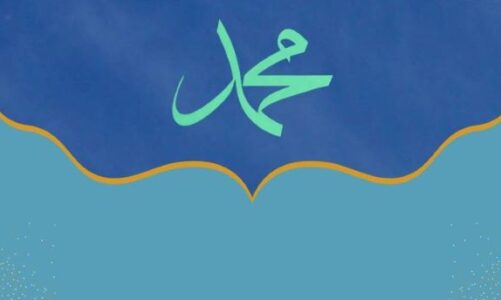With its consciousness, willpower, conscience, right to choose, moral stance, and rich material and spiritual resources, humanity holds a unique place among beings. From the first moment of existence in the womb, humans acquire a form and mold (a specific nature) with their increasingly specialized, limited, and narrowed potentials. For example, each person is constructed with a specific genetic information system originating from the gene pool that molds the human species, belonging to their parents’ lineage. After reaching a certain stage in the womb, a specific soul compatible with their genetic makeup is bestowed upon them. Upon opening their eyes, they are born into a specific sociocultural world. Their subconscious and character are shaped within an education model allowed by their parents and the sociocultural system they live in. From the ages of seven to nine, they possess a will and the right to choose, operating within certain limits. By the age of 17 or 18, they begin to deeply realize that they live in a world where everything is limited. They understand that they cannot do everything they want and must make choices and sacrifices. They see that every choice actually means forgoing thousands of options and enduring deprivation. They acquire a profession. They decide what they will know, do, and what they will forsake in knowledge and action. Because they neither have the energy nor the time to learn and do everything.
For the past few centuries, humanity has been systematically searching for ways to do more work with limited resources within defined time frames, to produce more and gain more, as a means to lead a blessed and quality life. Among these searches, a prominent solution is to conduct tasks according to “project management principles and functions.” Project management, a systematic approach to achieving defined goals within limited time using new paths and resources, forms the foundation of a sustainable enterprise and a healthy, peaceful, and prosperous life today. Because project management provides clues on how to use limited resources efficiently, effectively, and sustainably.
The word projectum (projectus) originates from Latin, combining pro (before) and jectus (to throw). A project is to send something we intend to do or achieve in the future into the future by imagining, shaping in our thoughts, and planning. Intention is extremely important in project management. Because whatever we want to project, our intention and thought on the matter must be pure and unadulterated. We must fully believe in our project, have no doubt about it, and never lose hope in the face of difficulties. From this perspective, saying Bismillah (In the name of God) when starting a task is a crucial step in the project. When we want to conduct a task with the understanding of project management, it becomes obligatory to define its scope, duration, cost, target outputs, performance criteria, quality, and success measures.
According to project management science, except for death, every problem has a solution, and there are multiple solutions as long as we plan to solve it and search accordingly with project functions. According to project management philosophy, the biggest project in life is not the jobs one does in their profession or the global-scale tasks done with others. The biggest project is the life of a person with limited resources and lifespan. The essence of the job is to plan one’s life from a broad perspective to make it meaningful and valuable, so at the end of the road, there are no regrets. Because every person is inevitably rushing towards death. It’s impossible to taste painless joy and peace in this life without making peace with death. The death ticket received at the end of this life can either be an eternal oblivion or fall into a prison. It can also be a reunion with loved ones, a passage to an eternal Paradise. Therefore, the biggest project is to send (projectus) from our current life to the future, to transform death with a valid faith passport from oblivion and an eternal dungeon to a gate of reunion with loved ones; to find the formula for painless pleasure and joy. One of the most blessed times to review our lives as the biggest project and to update the visa of our faith passport is the month of Ramadan. This is indicated in the Divine Declaration as follows: “(Fasting is for) a fixed number of days. If any of you is so ill that he cannot fast, or on a journey, he must fast the same number of other days. But for those who can no longer manage to fast, there is a redemption (penance) by feeding a person in destitution (for each day missed, or giving him the same amount in money). Yet better it is for him who volunteers greater good (by either giving more, or fasting in case of recovery), and that you should fast (when you are able to) is better for you, if you but knew (the worth of fasting).” (Baqarah, 2:185). In this world, we are all tested with the blessings given to us or the things we long for but are deprived of. We are responsible for the blessings given to us. This is the “life exam” project that we are unaware of. Ramadan is a great opportunity for us to successfully complete this project and pass the exam.
In project management, neglecting the human element is unethical. Therefore, individuals who neglect themselves and their families, focusing only on their work, cannot be good project managers. From the perspective of project management, a healthy, balanced person can lead a life that is physically, mentally, socially, and spiritually healthy and harmonious, can establish healthy communication with their family and social environment, and has a profession in life with material and spiritual earnings. From this perspective, Ramadan is a blessed month in which a person can establish healthy communication with themselves, their surroundings, and their Lord, and gain material and spiritual rewards.
Being dependent on human needs is essential for the continuation of life. However, if the acquisition and consumption of necessary things are not controlled, it turns into dependency and begins to negatively affect life. According to medical science, being fond of eating and drinking is a sign of health, while dependency is a pathological condition that makes a person a slave to their desires and lusts, destroying their freedom. Fasting in Ramadan acts as a brake against human carnal desires. Additionally, human nature is created as a dynamic structure with three layers: body, soul, and spirit. The system is also equipped with five sensory channels, primarily digestion, smell, and sight-hearing, controlling this tripartite nature. Fasting controls the operation of these channels, freeing a person from dependency.
Fasting in Ramadan, on one hand, breaks the rebellion of the self, preparing it to submit to God, the Educator of the universe; on the other hand, it breaks the selfishness and propensity to evil in the human self, encouraging good morals. It facilitates the discipline and obedience of the self by controlling its greed and excesses. It teaches patience and endurance by making a person experience them. It alerts the human conscience that in reality, one owns nothing, highlighting one’s impotence, poverty, and that everything belongs to God. It enables empathy, connecting with the poor around. The endless blessings of God are more easily comprehended. During this month, the doors to individual and collective gratitude are opened. Thus, a person feels in their conscience that gratitude is actually the key to the continuity of blessings and grace.
The applicability of project management principles depends on fulfilling certain functions. These functions are grouped into nine categories: scope, cost, time, risk, procurement, human resources, communication, quality, and integration management. Additionally, every nation has its own project implementation styles according to its sociocultural education level. European countries generally follow the define-plan-implement-complete-provide feedback; Americans, plan-implement-control-take action-monitor; Mediterranean countries, do-if not-retry-undo-retry.
In every task, there are variables we can define and control; uncertainties we cannot define; and risks we have defined but cannot control. Fasting in Ramadan, the Prayers performed, and the reflections based on them, on one hand, inform a person of their limits and teach what actions should be taken within the realm of causes as a true servant.
When looking at Ramadan and the act of fasting from the perspective of project management functions, all nine functions are present during Ramadan. Thus, Ramadan is actually a project of opportunities presented by God to humans. When evaluated in terms of scope, Ramadan includes everyone, regardless of their sins, mistakes, and rebellions. Forgiveness and purification are available to everyone, not just to believers with certain characteristics. Additionally, fasting in this month is not limited to just keeping the stomach empty. All physical and spiritual faculties of a person are responsible for observing their own fast. Therefore, fasting is a comprehensive act of worship that includes all organs and faculties. From a cost/benefit management perspective, Ramadan is a month of spiritual trade with low costs and high profits. The Divine Declaration states: “God has bought from the believers their selves and wealth because Paradise is for them.” (Tawbah, 9/111). In terms of time management, a person with firm intention can gain spiritual wealth for the afterlife during Ramadan. One can earn a lot of rewards in a short time. For example, every good deed and act of worship in this month has ten to thirty thousand times the reward. In such a time frame, the Ramadan project of selling one’s self and wealth to God (may He be glorified and exalted) and becoming His servant and soldier is understood to be a highly profitable trade and an honorable rank. However, there is a risk that the good deeds and acts of worship performed may lead to pride, boasting, and a sense of sufficiency in oneself. Additionally, since there is a possibility that good deeds and acts of worship may be performed not solely for the sake of gaining God’s (may He be glorified and exalted) pleasure but for worldly benefits, this risk must be well managed. From a procurement management perspective, the continuity of worship depends on healthy, balanced nutrition and sufficient energy intake, so needs like nutrition, rest, and sleep should not be neglected and must be done in moderation.
From a human resources perspective, Ramadan is a month of cooperation, integration, and socialization. Special days in this month enhance and peak people’s social intelligence. The holiday at the end of the month offers opportunities for reconciliations. It’s a month where our relationships are polished and shined. In terms of communication management, Ramadan offers an opportunity to mend the disconnects and fractures in our communication with others, our Creator, the world around us, and our deepest selves. In quality management, the importance of performing our acts of worship not hastily but with due quality and sincerity is emphasized. The importance of performing worship purely for God’s pleasure, away from show, is better understood.
In terms of integration management, the acts of worship we perform should create a unity within our lifestyle, and the good habits acquired in Ramadan should continue after it ends. Additionally, the mechanisms of intellect, heart, conscience, and desire should be directed towards a common goal, reducing contradictions in our life. In other words, the effort to be a person of integrity and character at every moment of our life and to continue this effort should be made.




